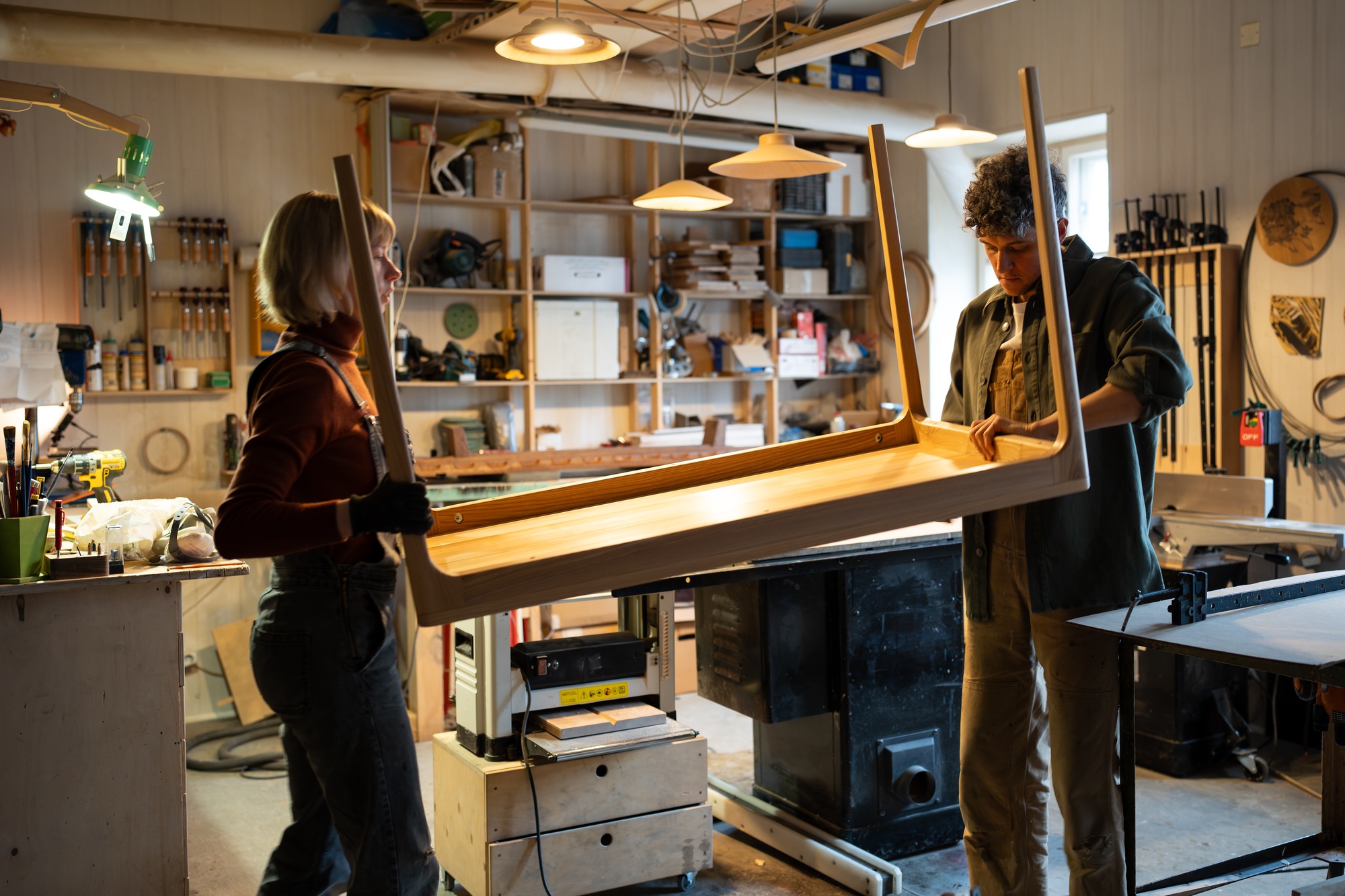Key Takeaways

- Handmade businesses thrive by offering unique, personalized products that resonate with consumers seeking authenticity and quality over mass-produced items.
- Key niches in the handmade market include custom jewelry, personalized gifts, home decor, and artisanal food products, providing ample opportunities for entrepreneurs.
- Platforms like Etsy serve as essential marketplaces for selling handmade goods, making it easier for creators to connect with a broader audience without extensive technical knowledge.
- Effective online presence and promotion through social media platforms are crucial for driving traffic and establishing community engagement around your handmade brand.
- Identifying your niche and differentiating your products are critical strategies for success in a competitive handmade market, allowing you to attract targeted customers.
- Managing finances, including pricing strategy and tracking expenses, is vital for ensuring profitability and sustainable growth in your handmade business.
In a world where mass production dominates, handmade businesses offer a refreshing alternative that resonates with creativity and individuality. If you’ve ever dreamed of turning your passion for crafting into a profitable venture, you’re in the right place. Handmade products not only showcase your unique skills but also appeal to consumers seeking authenticity and personal touch.
Exploring handmade business ideas can unlock a wealth of opportunities. Whether you’re a talented artisan or just starting out, there’s a niche waiting for you. From custom jewelry to eco-friendly home decor, the possibilities are endless. Get ready to dive into the exciting realm of handmade entrepreneurship and discover how you can carve out your own space in this thriving market.
Handmade Business Ideas Overview

Handmade businesses present exciting opportunities for small business entrepreneurs. They offer a creative outlet while meeting the growing demand for unique, personalized products. Many consumers prefer handmade options over mass-produced items, focusing on quality and individuality.
Etsy serves as a premier platform for selling handmade goods, allowing you to connect directly with customers seeking distinctive craft items. Popular categories include custom jewelry, tailored clothing, and eco-friendly home decor. DIY enthusiasts can tap into this market by creating items that reflect personal flair and craftsmanship.
Consider exploring niches within the handmade market. Options such as personalized gifts, artisanal food products, and sustainable fashion items can attract various customer bases. Focus on your strengths as a creator, and harness the potential of your skills to build a thriving small business in the handmade sector.
Popular Handmade Business Ideas

Handmade businesses present numerous opportunities for creative entrepreneurs. Here are several popular categories where you can apply your craft skills and find success.
Crafts and Artifacts
Create unique items such as jewelry, toys, and wooden crafts. Jewelry making involves using materials like beads, metals, and clay to craft one-of-a-kind pieces. Handmade toy making can include wooden cars or plush stuffed animals made from organic fabrics. Woodworking allows you to produce custom furniture and decorative items, which may also involve upcycling old pieces for added sustainability. Utilize platforms like Etsy to showcase your crafts, reaching customers eager for distinctive artifacts.
Personalized Goods
Focus on crafting personalized items that resonate with consumers looking for meaningful gifts. Customized products like engraved jewelry, monogrammed bags, or tailored clothing stand out in the market. Opportunities in DIY personalization allow you to leverage your skills to create unique, treasured items. As customers increasingly seek authenticity, your handmade personalized goods can fill that gap, appealing to those desiring thoughtful and individualized presents.
Home Decor Items
Explore the home decor segment, which thrives on creativity and uniqueness. Handmade decor items such as wall art, candle holders, and decorative pillows allow for artistic expression while providing customers with stylish accents for their homes. Eco-friendly materials and techniques can enhance your appeal, positioning your products within the sustainable market. Selling through online platforms like Etsy enables you to tap into a vast audience seeking handcrafted decor that adds a personal touch to their interior spaces.
Online Marketplaces for Handmade Products

Online marketplaces provide a vital platform for your handmade products, allowing you to reach a broader audience. Here are key options to consider.
Etsy Essentials
Etsy serves as the leading platform for small businesses focusing on handmade and vintage goods. Its low barriers to entry suit many aspiring entrepreneurs. No prior web design skills are necessary, making it accessible for crafters and DIY enthusiasts. Success on Etsy hinges on understanding your target market, ensuring quality in your products, and offering items like custom jewelry, craft supplies, and personalized clothing. Incorporating digital instructions or patterns can further enhance your product offerings and appeal to a wider range of customers.
Social Media Platforms
Social media platforms play an essential role in promoting your handmade business. Utilizing channels like Instagram and Pinterest can showcase your work effectively, driving traffic to your Etsy shop. Visual content captivates potential buyers, highlighting the uniqueness of your crafts. Engaging with your audience through regular posts, stories, and direct interactions can foster community and brand loyalty, making it easier to turn followers into customers.
Tips for Starting a Handmade Business

Starting a handmade business involves strategic steps to ensure success in the competitive market. Focus on these key aspects:
Identifying Your Niche
Identify your niche by assessing both your skills and market demand. Craft unique products that stand out, whether it’s custom jewelry, handcrafted furniture, or eco-friendly home decor. Analyze trends on platforms like Etsy to discover popular items and gaps in the market. Tailor your offerings to specific audiences, such as personalized gifts for special occasions or sustainable fashion for environmentally conscious consumers. Emphasizing quality and authenticity in your handmade products will attract discerning buyers.
Creating an Online Presence
Create an online presence by establishing a professional Etsy shop. This platform connects you with customers seeking distinctive handmade goods. Use high-quality photos and engaging descriptions to showcase your crafts effectively. Optimize your shop for search engines by incorporating relevant keywords into your product titles and descriptions. Leverage social media platforms like Instagram and Pinterest to share your creative process and connect with potential customers. Regularly post updates and interact with your audience to build a supportive community around your brand.
Challenges in the Handmade Business

Starting a handmade business presents unique challenges that you must navigate for success. Recognizing these obstacles helps you make informed decisions and adapt your strategies effectively.
Competition and Differentiation
The handmade market is increasingly competitive as more people enter the space, particularly on platforms like Etsy. Differentiating your products becomes crucial. Focus on defining your unique selling proposition (USP), whether it’s innovative designs, sustainable materials, or superior craftsmanship. Highlight specific features that make your creations stand out, like customizable options or limited edition pieces. Identifying your niche can set your small business apart in a saturated market and attract targeted customers seeking distinctive crafts.
Managing Finances
Managing finances can be a challenging aspect of running a small business. You must track expenses, set competitive prices, and ensure profitability. Start by calculating the cost of materials, labor, and overhead expenses to determine your pricing strategy. Utilize accounting software or spreadsheets to monitor cash flow and sales performance. Setting aside a portion of each sale for taxes prevents financial surprises at tax time. Consider reinvesting profits into the business for growth or additional inventory. A solid financial plan enables sustainability and long-term success in the handmade industry.
Conclusion

Exploring the world of handmade businesses opens up a realm of creative possibilities. With a growing demand for unique and personalized products you can carve out your niche and connect with customers who appreciate authenticity.
Embrace your skills and passion to create high-quality items that resonate with your audience. Remember to leverage platforms like Etsy and utilize social media to showcase your work and build a loyal community.
By focusing on your strengths and understanding market trends you can turn your handmade creations into a thriving business. The journey may have its challenges but with dedication and a clear strategy you’ll be well on your way to success in this vibrant industry.
Frequently Asked Questions

What are the benefits of starting a handmade business?
Starting a handmade business allows you to express creativity while offering unique products that stand out from mass-produced items. It provides flexibility in setting your schedule and can lead to a fulfilling career that aligns with your passions. Additionally, there is a growing demand for personalized and eco-friendly products, creating market opportunities.
How can I sell my handmade products online?
You can sell your handmade products online through platforms like Etsy, which connects creators with customers seeking unique items. Establishing an online shop involves creating quality listings with appealing photos and descriptions, optimizing for search engines, and promoting your products on social media.
What types of products can I make and sell?
There are countless options for handmade products, including custom jewelry, personalized gifts, artisanal foods, and eco-friendly home decor. Focus on your strengths and interests to find a niche that fits well, such as sustainable fashion or unique crafts like wooden toys or tailored clothing.
How do I promote my handmade business?
Promoting your handmade business can be effectively done through social media platforms like Instagram and Pinterest. Regularly posting engaging content about your products, sharing the creative process, and interacting with followers can build a loyal community and drive traffic to your shop.
What challenges should I expect when starting a handmade business?
Starting a handmade business comes with challenges like competition and market differentiation. It’s crucial to define a unique selling proposition (USP), manage finances effectively, track expenses, and set competitive prices to ensure sustainability and long-term success in the handmade market.
Image Via Envato: ira_evva, myjuly, svetlaya_83, romankosolapov, Albertshakirov, ASphotostudio, DC_Studio, varyapigu



